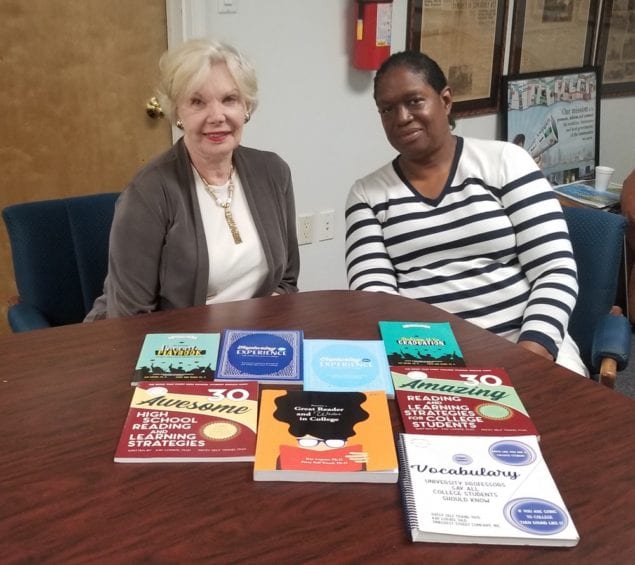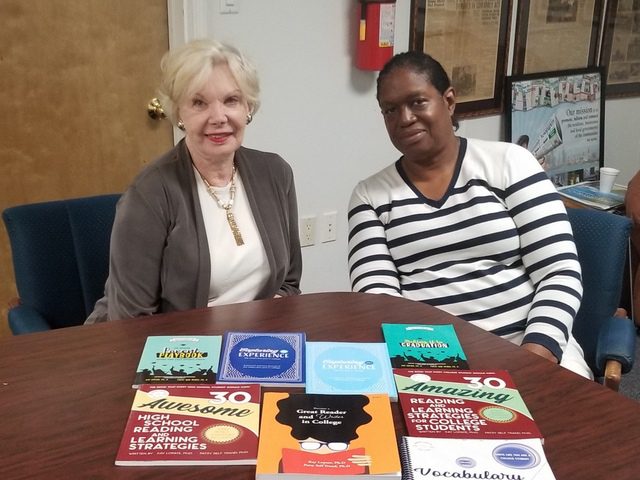
(Photo by David Berkowitz)
Typical high school graduation gifts are gift cards, cash, bedding, technology gifts, collegiate clothing, and dorm accessories. But, one gift, unlike the others, will last a lifetime and can make a big difference in your student’s future.
In fact, it might make the difference between dropping out of college and earning a college degree. Many consider this
“overlooked gift” as the “best gift.” It’s the gift that helps the high school graduate become more successful in learning and reading from college-level textbooks. In other words, after a student is accepted to college, that student needs a high level of reading proficiency to “make it to graduation.”
A high school degree and acceptance to a college or university doesn’t assure that a student is able to read and learn from college texts. There is a high cost of not being able to read on a college level since a college education is based on a high level of reading proficiency.
“Making that intellectual leap into reading complex discourse is a task that many students do not know how to do,” said Dr. Kay Lopate, a retired faculty member from the University of Miami School of Education. “They are smart students, but stunned by the amount and complexity of the reading and thought that they must suddenly do.”
Estimates are that a large number of college freshmen read on a seventh grade level. ACT reports that only about half the students tested are ready for college (2005). How are students reading on a seventh grade level going to master the information from a 13th grade level textbook? How will they pass exams based on independently reading their assigned textbook? How will they “make it to graduation?”
Dr. Patsy Self-Trand, a retired faculty member from Florida International University College of Arts, Sciences, and Education, feels that not only those students who are reading below level struggle, but many students on level also struggle. Dr. Self-Trand witnessed in her 35 years of teaching reading and learning that “smart students” can also make poor grades. She agrees with Dr. Lopate that the “unspoken requirement for college is how to read and learn college material.”
A few reasons why students underachieve in reading are:
Specific reading instruction is rarely given after students complete middle school. High school teachers assume students have the appropriate reading skills to comprehend high school textbooks. However, the facts are some high schools are better than others and some teachers are better than others.
Reading comprehension is a skill, like other skills, which needs practice. Ask yourself, “Does your high school student get a lot of practice reading? Does he or she read magazines, newspapers, or library books? Or, does he or she spend time being entertained by the media, video games, or Netflix?”
Parents are generally involved in the early stages of reading and then their involvement wanes. They assume their children are receiving instruction and further assume they are advancing one year in reading for every year in school. Typically, this is not the case.
Reading instruction must continue to the college level, either directly or indirectly to guide students how to learn and critically read college level material.
Drs. Lopate and Self-Trand have a combined 60 years of working as professors and learning specialists at two major universities with smart students who many struggle making the “intellectual leap” from high school to college.
Recently, they have written nine books that strengthen and build the needed foundation for those seeking a college degree. As they wrote each book, they kept two goals in mind: One was to write books that motivated students to read and enjoy and the second goal was for students to gain the reading and writing competencies needed for college success. Drs. Lopate and Self-Trand contend they have reached their goals because of their years of experiences with underprepared and very smart college students.
The books cover all aspects of literacy that provide a stronger foundation for college. Each book is enjoyable, interesting, motivating, and encouraging.
“Becoming a Great Reader and Writer in College: Book 1” and “Getting the Basics of Critical college Reading and Writing: Book 2” are two books that provide a foundation in basic reading to critical thinking skills. Students learn from the many exercises in each book. Book 3 and Book 4 which complete the Four-Book Series will be available August 2019. Book 3 concentrates on comprehending social science and history course information and Book 4 focuses on STEM (science, technology, engineering, and math) courses.
“Vocabulary University Professors Say All College Students Should know” is a collection of 205 words the authors collected from college professors. They refer to these words as “The Big 205.” There are accompanying exercises to assure mastery of the words.
These exercises go far beyond “look it up in the dictionary and write a sentence.” Each set of 20 words has a “fun” learning exercise.
Dr. Trand reports that the book begins with instruction about how to write college-level sentences and paragraphs. The goal is for students to acquire these new terms and to use them for their college writing assignments.
“Making it to Graduation” is a motivating, creatively illustrated book that contains sound advice to help the student achieve intellectually, socially, and academically. Many say it is the “unwritten course” that is never taught but has the information incoming collge students need to know. Dr. Lopate feels this is the foundation text that leads college students on the right path to graduation.
“The Official Parent Playbook: Getting your Child Through College” is the companion book for parents who want to continue guiding their child through the college experience. With a smile, both Drs. Lopate and Self-Trand remark this is a parent’s way of not completely “letting go.”
Two writing journals are “Capturing the Experience: My First Year in College” (for first year students) and “Capturing the Experience: My Child’s First Year in College” (for parents who want to make certain that all college memories are preserved.)
Drs. Lopate and Self-Trand know that college-bound students have a greater chance for success in college when their literacy skills are intact. Even with the widespread use of technology in education, a college education is still based on reading.
The authors emphasize that completing college is dependent on basic reading skills, vocabulary, critical thinking, and study/learning skills. They stress that it’s especially important to give incoming college students reading instruction and practice now — before they begin any challenging college course. Keep in mind that every smart student can become even smarter — they just need to learn how.
Kay Lopate has been living in Pinecrest since 1967 and Patsy Self-Trand has been living in the Kendall area for more than 35 years.
Visit their website Pinecreststreetcompany.com and view yhe books on Amazon.com.







Dr. Self really helped me achieve when I was at FIU! I’ve been hoping to connect with her! She’s amazing!